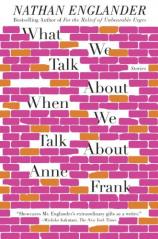What We Talk About When We Talk About Anne Frank: Stories
Review
What We Talk About When We Talk About Anne Frank: Stories
Nathan Englander is a very busy man these days. He is preparing a play for production on Broadway based on his previously written short story, “The Twenty-Seventh Man.” In March he will publish The New American Haggadah, a modern translation of the text celebrated each Passover by Jews around the world. The New Yorker has recognized Englander as one of “20 Writers for the 21st Century.” WHAT WE TALK ABOUT WHEN WE TALK ABOUT ANNE FRANK, a collection of eight stories, is testament to the worth of a writer whose skill comes from a remarkable ability to share his feelings with readers on the pages of his haunting and unforgettable stories.
"WHAT WE TALK ABOUT WHEN WE TALK ABOUT ANNE FRANK is a beautiful collection of enthralling, thoughtful and beautiful stories from one of America’s great young writers."
The title story begins with humor and ends with poignancy. Two friends reunite after decades of separation. Through the auspices of Facebook and Skype, childhood friends Deb, now living in Florida, and Lauren, residing in Israel, meet in Florida when the Israeli couple visit Lauren’s ailing mother-in-law. The couples begin comparing modern life in America with Orthodox Judaism in Israel. While they have little in common, they discover some common ground when they break into the marijuana stash of the Florida couple’s teenage son.
Eventually the couple’s discussion turns to a game played by the girls in their youth, the Anne Frank game. The story centers on a common theme: the horror of the Holocaust and how Jews around the world, regardless of nationality or strength of observance, deal with the pain of that era. It is the glue of the Holocaust that can never be eradicated from Jewish life.
“Camp Sundown” is another Holocaust-themed story. Residents of an Elderhostel confront the camp leader with a moral quandary when they suggest that one of the camp residents is not the person he claims to be. The elderly camp members demand justice while the young camp leader weighs several alternatives. It is an all-too-familiar debate, one that sometimes rages in the national media albeit with less frequency as Holocaust participants die simply from old age rather than facing justice. Englander raises important questions in this story that will not die, even as the last victims and participants in the Holocaust pass from the earth.
Veering from the Holocaust theme, “Peep Show” is a story that reads as if it were an episode of “The Twilight Zone.” Leaving his law office in New York City and returning to his suburban home, Allen Fein detours into a sleazy 42nd Street theater. Girls are present, of course, but Fein is shocked to discover that other patrons of the show include his former Talmud instructor and other Rabbis from his youth. Through these meetings, Fein confronts life decisions. Readers of “Peep Show” may be forced to re-examine their own lives through its pages.
“The Reader” is the one story in the collection unlike any of its mates. A once-famous author is on a national tour promoting his book. In the early pages, one might think this is some type of biographical memoir written by Englander. Instead, it is the opposite, because the title character is on a disastrous tour where eventually only one persistent man attends his readings. In one beautiful passage, Englander notes, “Really, how much richer could a reading life be than finding, even for one night, one true reader?” Perhaps the story is biographical, and Englander is telling us that writers write for the one true reader.
If, in fact, that is Nathan Englander’s goal, then he has accomplished that task. WHAT WE TALK ABOUT WHEN WE TALK ABOUT ANNE FRANK is a beautiful collection of enthralling, thoughtful and beautiful stories from one of America’s great young writers.
Reviewed by Stuart Shiffman on February 9, 2012
What We Talk About When We Talk About Anne Frank: Stories
- Publication Date: March 5, 2013
- Genres: Fiction, Short Stories
- Paperback: 240 pages
- Publisher: Vintage
- ISBN-10: 0307949605
- ISBN-13: 9780307949608





